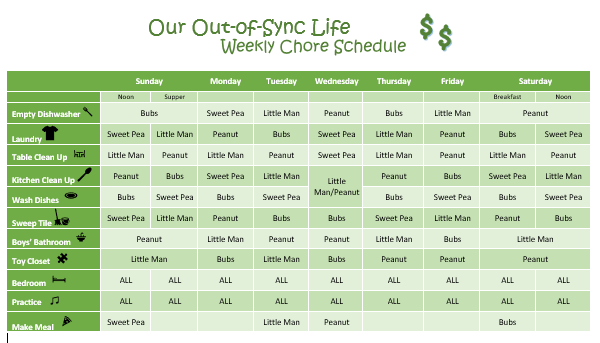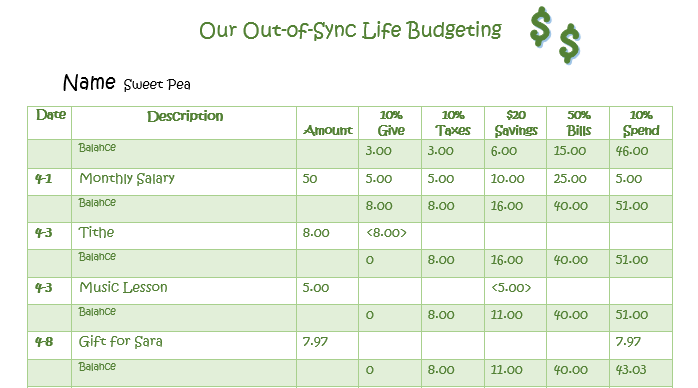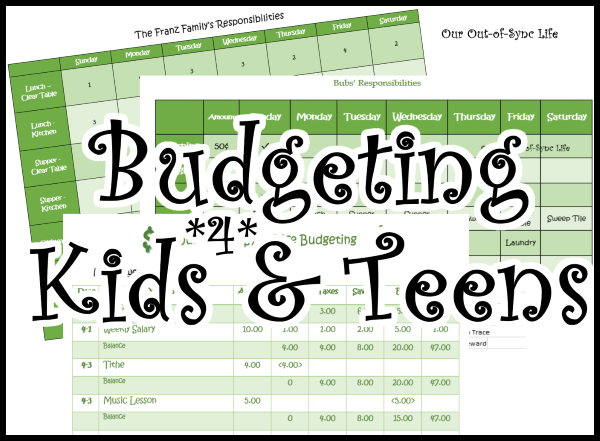
In 2014, I shared a Money Management and Behavior System for Preschoolers. It worked beautifully in our home to teach our young children responsibility, encourage good behavior, and set a foundation for wise money management.
Now five years later, our children are in school and entering the teenage years. I realize that we need to further the learning to prepare them for adulthood.
Today I am going to share the what, why, and how we are teaching our children money management and responsibility. I am prayerful that it will empower you to tweak the system for your family.
Making a Plan
For several years I was admittedly against paying our children for basic chores and responsibilities. But in our instant-gratification and materialistic world, I have realized that our children must learn to manage money at young ages to be able to wisely manage it as adults. It became my goal to create a system as much like the real world as possible.
Because of this, each child receives a monthly salary which is divided into the following categories:
- 10% Tithe
- 10% Taxes
- 20% Savings
- 50% Bills
- 10% Spending
Salary Earned
The salary is given based on expected responsibilities in our home. Then, deductions from their salary occur when these chores are not finished (though this rarely happens).

Chores (Ages 8-14)
- Laundry
- Empty Dishwasher
- Clean off Table
- Clean up Kitchen/Dishes
- Sweep
- Clean Bedroom, Bathroom, Toy Closet
- Garden and Landscape Assistance
- Trash
- Assist or Make a Meal
- Practice Musical Instrument
These chores have been divided into a weekly schedule (see below) and for simplicity this schedule rarely changes. Each child is also responsible to make sure that they have “left no trace” – no clothes on the floor, toys left out, and papers in the van – and have been a good steward – take care of what God has provided for us. This includes turning off lights and not wasting food.

It is each child’s responsibility to get their jobs done before bedtime. And, if an activity comes up not allowing them to fulfill their job, it is their responsibility to either trade or negotiate for someone to fill in for them.
A child’s job is to “work with all their heart” (Col 3:23). Thus, expectations are based upon the child’s ability and not the end result. This schedule will be revamped during the summer months as our schedule changes.
This is key. There are no reminders or threats to finish responsibilities.
Salary Amount
In creating this budgeting system, I struggled to develop an appropriate salary of each child. Soon I realized that it was no different than creating a budget for our family.
To began, I created a list of what each child would be responsible to pay for – their bills. This list will gradually grow each year with the goal that by the time they graduate from high school our kids have had experience budgeting for everything except for food, utilities, and shelter.
Right now the children are responsible to pay for a portion of their music lessons, summer camp, gifts, extra clothing, and school activities. These are

Do not get hung up on the salary amount as it can and will need to be adjusted. The key is to give the child responsibilities and monthly bills, and then create a budget around it. The more that the child is required to pay for, the higher their monthly salary must be.
Money Management
Because the children have a spending category, there is no longer the temptation to beg mom and dad to buy them something. I simply refer them to their budget sheet to see if they have funds to purchase the item. Savings is being built up for a vehicle and can not be touched otherwise. Taxes will be used for a fun family activity.
Moment of honesty…one of our children is a spender. He loves to buy and it really doesn’t matter what the item is. It kills me to see him spend unwisely but the Holy Spirit reminds me that he can learn now or when he is an adult. I must allow him to fail while the stakes are low. Sigh.

Building Responsibility
I {LOVE} this system. While it is teaching the children responsibility, it allows my husband and I time after supper to sit on the couch and talk while the children work on supper cleanup. The system holds me accountable to train our children how to make meals. Also, there isn’t a confusion on whose responsibility it is to do a specific job. The chart doesn’t lie.
Unlike many of the budgeting systems I have seen, this one doesn’t require a lot of cash to be on hand because the children are only given real money when a payment is made. The rest of the time, their “account” is used like a debit card. And, it may seem excessive to give a child $50 a month, but remember that the vast majority of the weekly salary is money you are already paying. So instead of you paying their bills, the children will.
This system is also flexible enough to allow for character education and taking initiative. Sometimes mommy does a chore for a child providing a wonderful opportunity to discuss grace and kindness. We don’t list every chore that needs to be done to keep our home afloat but this system allows each child to take initiative in areas of need.

To develop a work ethic and budgeting mentality in your home, I have created a workbook for your kids and teens. Use the ideas above to create sheets for your needs and tweak the system to work for your family! Print your free Budgeting for Kids and Teens Workbook here.
More Ideas:
- Giving Your Child the Gift of Work
- Teaching Money Management to Children
- Are You Giving Your Child the Gift of Work
- Contributions (Chores) and a Visual Schedule
- Money Management and Behavior System for Preschoolers
- So Much Easier to Do it Myself
